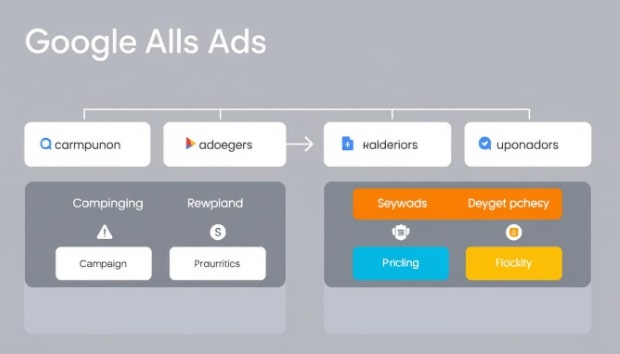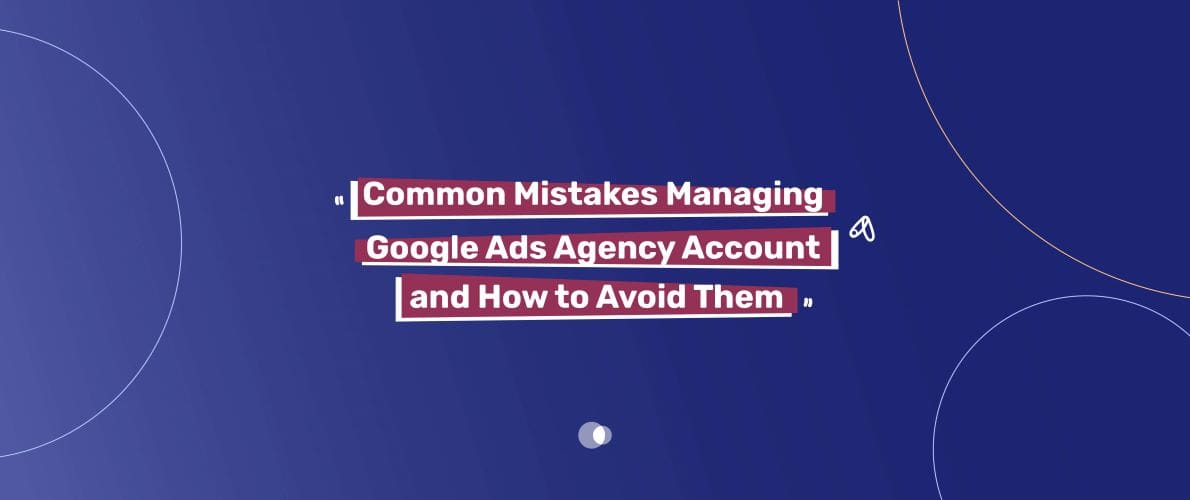Managing Google Ads can be tough for marketing agencies. There are many pitfalls that can stop clients from succeeding. We’ll look at the most common mistakes and how to avoid them.By learning the basics of Google Ads management, you can do great work. You’ll keep clients happy and help your agency grow.
Table of Contents

Key Takeaways
- Understand the core components of successful Google Ads agency account management.
- Implement effective communication and reporting practices with clients.
- Optimize budget allocation and campaign structure for maximum impact.
- Prioritize account security and access management protocols.
- Continuously monitor and optimize campaign performance for optimal results.
Understanding the Fundamentals of Google Ads Agency Management
Managing Google Ads well means knowing the basics. Agencies need to understand how to manage accounts and use PPC tools effectively. This is crucial for creating great client campaign strategies.
Core Components of Successful Agency Account Management
Good Google Ads management starts with a solid plan. Agencies must know how to organize campaigns and improve performance. They need skills in keyword research, ad writing, and targeting to help clients succeed.
Essential Tools and Resources for Agency Success
Successful agencies use the right PPC tools to work better and faster. They need tools for managing campaigns and analyzing results. Keeping up with new tools and practices is key to excellent client service.
Building a Strong Foundation for Client Campaigns
Starting a client campaign right is all about a strong base. Agencies must learn about their clients’ goals and who they want to reach. This way, they can create strategies that really work. Good communication and teamwork help build trust and partnership with clients.
“Mastering the fundamentals of Google Ads is the key to unlocking the full potential of your agency’s client campaigns.”
Mistakes Managing Google Ads Agency Account: Key Issues to Address
Managing Google Ads accounts for clients can be tough for agencies. They face many challenges that affect campaign performance and client happiness. It’s important for agencies to know these Google Ads mistakes, agency account management issues, and PPC challenges. This way, they can avoid advertising pitfalls and give great results.
Agencies often struggle because they don’t fully understand Google Ads. They might find the interface too complex or not know how to optimize campaigns. This can lead to poor campaign results. Also, not checking and adjusting campaigns often means missing chances to get better.
Another big problem is not telling clients how their campaigns are doing. Agencies might not give clear reports. This can make clients unhappy, distrustful, and damage the relationship between them and the agency.
Agencies also might not use budgets well or set up campaigns to get the best results. This can hurt their ability to succeed for their clients.
Lastly, agencies might not take care of account security and access. This can put clients’ data at risk. Not using strong security, like two-factor authentication, can be very bad.
To fix these problems, agencies need to keep learning, invest in good tools, and have strong processes. By doing this, they can do well and make their clients happy.
| Common Google Ads Mistakes | Impact on Agency Account Management |
| Lack of platform expertise | Suboptimal campaign performance |
| Ineffective communication and reporting | Strained client-agency relationship |
| Improper budget allocation and campaign structure | Poor return on investment for clients |
| Neglecting account security and access management | Potential data breaches and unauthorized access |
By tackling these key issues, agencies can succeed and make their clients happy.
Poor Communication and Reporting Practices with Clients
Good communication and clear reports are key to a strong agency-client bond. In PPC, where data matters a lot, talking clearly is vital. It helps build trust and manage what clients expect.
Establishing Clear Communication Channels
It’s important to have clear ways to talk to each other. Decide how often, what format, and what to talk about. Also, pick who will talk to whom. Being proactive, checking in often, and knowing who does what helps a lot.
Creating Effective Reporting Templates
Good reports show how PPC campaigns are doing. They should match what the client needs, with important data in a simple way. This helps clients understand their campaigns better and see the agency’s worth.
Setting Realistic Client Expectations
It’s crucial to manage what clients think is possible. Tell them about the good, bad, and when things will happen. This way, everyone knows what to expect and can work well together.
“Effective communication and transparent reporting are the keys to a successful agency-client relationship in the world of PPC advertising.”
Ineffective Budget Allocation and Campaign Structure
Managing PPC budgets and setting up Google Ads campaign structure well is key for agencies. They help clients manage their PPC budgets and improve ad spend. But, many agencies find it hard to set up Google Ads campaigns well. This leads to poor ROI improvement for their clients.
One big mistake is not spreading the budget evenly across campaigns or ad groups. Agencies might focus too much on broad-match keywords. They ignore the value of long-tail and specific search terms. This can cause wasted ad spend and missed chances for better PPC budget management.
- Regularly check and adjust the budget based on how well campaigns are doing and where ROI can improve.
- Use strategies like bid adjustments, negative keywords, and audience targeting to make Google Ads campaigns more efficient.
- Understand your clients’ business goals well and make sure the Google Ads company supports those goals.
By fixing these common mistakes and using a strategic approach to PPC budget management and Google Ads campaign structure, agencies can help their clients get the most out of their ads. This leads to better ROI improvement.

Neglecting Account Security and Access Management
In the world of Google Ads agency management, account security and access control are often overlooked. Protecting your client’s data and ensuring only authorized access to their Google Ads account is key. A breach can harm your agency’s reputation and your client’s business.
Implementing Two-Factor Authentication
Securing Google Ads accounts starts with two-factor authentication (2FA). This adds an extra layer of security. It makes sure only approved people can get into the account, even if someone else has their login info. Tell your clients to turn on 2FA and make it a rule for your agency too.
Managing User Permissions and Access Levels
It’s important to control and watch who has access to your client’s Google Ads accounts. Give each team member the right role and access they need. Check and change these permissions often to keep a close eye on who can do what.
Regular Security Audit Protocols
Having a solid security audit plan is key to finding and fixing any weak spots in your Google Ads account management. Do security audits often to make sure everything is set up right. Also, keep up with the latest Google Ads security tips to keep your agency safe.
Putting account security and access management first helps protect your client’s data and keeps your agency’s reputation strong. Ignoring these important steps can put your clients at risk and hurt your agency’s success.
Overlooking Campaign Optimization Opportunities
In the world of Google Ads, many agency managers miss the importance of campaign optimization. Not focusing on improving PPC campaigns can hurt performance. This can cost clients a lot of time and money.
Effective google ads advertising agency optimization unlocks your clients’ advertising potential. By testing ad variations, improving keyword targeting, and adjusting audience segments, you boost PPC performance improvement. This maximizes their investment return.
To make sure your agency’s campaigns reach their best, try these strategies:
- Test new ad copy, visuals, and landing pages to find the most effective ones.
- Keep checking and tweaking your keyword targeting. Add new keywords and remove old ones that don’t work.
- Use audience data to find the most interested groups. Then, adjust your targeting to reach them better.
- Use advanced campaign refinement tools like bid adjustments and automated bidding to meet specific goals.
By focusing on Google Ads optimization and PPC performance improvement, your agency can give great results. You’ll be seen as a reliable partner in campaign refinement efforts.”The key to successful Google Ads management is continuous optimization. Never stop testing, refining, and improving your campaigns.”

Improper Tracking and Conversion Setup
In today’s fast-paced digital marketing world, setting up conversion tracking right is key. Without it, you face problems like bad data-driven decision making and poor performance monitoring. This part talks about the need for correct conversion tracking, watching important Google Ads metrics, and fixing common tracking issues.
Installing Conversion Tracking Correctly
Getting conversions right, like website sales or form submissions, is crucial for Google Ads success. Agencies must make sure conversion tracking is set up right. This means working with the client’s team, checking the setup, and testing it often to catch all actions.
Monitoring Campaign Performance Metrics
After setting up tracking, agencies need to watch Google Ads metrics closely. They should track things like click-through rate (CTR), cost-per-conversion, and return on ad spend (ROAS). This helps find ways to make campaigns better and make smart choices based on data.
Troubleshooting Common Tracking Issues
- Incorrect or missing conversion tags
- Discrepancies between Google Ads and website analytics data
- Improper tracking of cross-device and cross-channel conversions
- Tracking issues caused by browser extensions or ad blockers
Agencies must be ready to find and fix these conversion tracking problems fast. This keeps data accurate and helps make better decisions. By solving these issues quickly, agencies can keep client trust and keep improving campaigns.
Failing to Adapt to Platform Updates and Changes
In today’s fast-paced digital marketing world, keeping up with Google Ads updates and PPC industry trends is key. Agencies that don’t adapt to these changes fall behind. They can’t deliver the best results for their clients.
To stay ahead, your agency needs to be agile and adaptable. It’s important to have a culture that values platform adaptability and staying current. This means watching for Google Ads updates, understanding their impact, and making quick changes to client campaigns.
- Regularly review the Google Ads blog and official announcement channels to stay informed about platform updates and new feature releases.
- Analyze how these changes may affect your clients’ campaigns and proactively adjust strategies and tactics accordingly.
- Allocate resources for ongoing training and upskilling of your team to ensure they are equipped to handle platform changes and leverage new capabilities.
- Foster a culture of continuous learning and adaptation, empowering your team to be proactive in identifying opportunities and implementing best practices.
“The key to staying ahead in the PPC industry is to embrace change and view platform updates as opportunities to optimize and improve campaign performance.”
By keeping up with Google Ads updates and industry trends, agencies can be seen as reliable partners. They can deliver top-notch results for their clients and stay competitive.
Not Implementing Proper Quality Control Measures
In the world of Google Ads agency management, keeping campaigns high quality and making clients happy is key. But, many agencies forget the need for strong quality control. This can cause poor campaign results, unhappy clients, and lost growth chances.
Creating Quality Assurance Checklists
Creating detailed checklists for each campaign stage is a great way to ensure quality. These should include Google Ads quality control, ad copy checks, keyword research, and bid strategy tweaks. This standardizes quality, reducing mistakes and keeping client work top-notch.
Regular Account Auditing Procedures
Along with checklists, regular account auditing is crucial for Google Ads agency health. A systematic auditing approach helps spot and fix problems early. This keeps client campaigns running smoothly and following platform rules.
Performance Monitoring Systems
Good performance monitoring is at the heart of agency best practices. With solid performance monitoring systems, agencies can spot and fix performance drops fast. This leads to quick improvements and clear results for clients.
By focusing on quality control, agencies can earn a top reputation. They build strong client relationships and become reliable partners in the Google Ads world.
Conclusion
Managing a Rent Google Ads agency account well needs a detailed plan. It’s about avoiding common mistakes and improving how campaigns work. This article has shared key strategies to help your agency succeed with Google Ads.
Using strong security, the right tools, and keeping up with updates is crucial. It makes sure your clients’ ads perform well all the time. Also, checking and improving your quality control helps build your agency’s good name.
The main way to beat Google Ads challenges is to follow best practices and keep up with changes. Building strong client relationships is also key. By doing what this article suggests, you can make your agency better, gain your clients’ trust, and grow in the Google Ads world.
FAQ
1)What are the core components of successful Google Ads agency account management?
Successful Google Ads management starts with a solid understanding of Google Ads basics. It also involves using key tools and resources. A strategic plan for client campaigns is also essential.
2)How can agencies establish clear communication channels with their clients?
Agencies can set up clear communication by creating detailed reporting templates. They should also manage client expectations and keep in touch regularly. This ensures open and timely communication.
3)Why is proper budget allocation and campaign structure important in Google Ads agency accounts?
Proper budgeting and campaign setup are key to spending wisely. They help improve ad performance and increase client returns. This is crucial for success.
4)How can agencies ensure the security of their Google Ads agency accounts?
Agencies can secure their Google Ads accounts by using two-factor authentication. They should also manage user access and conduct security checks often. This keeps the account safe.
5)What are the key opportunities for campaign optimization in Google Ads agency accounts?
Campaigns can be optimized by testing ads, refining keywords, and targeting the right audience. Regularly checking and adjusting performance is also important.
6)Why is proper tracking and conversion setup important in Google Ads agency accounts?
Accurate tracking and conversion setup are vital for collecting reliable data. This data helps monitor performance and make informed decisions to boost campaign success.
7)How can agencies stay adaptable to Google Ads platform updates and industry changes?
Agencies can stay up-to-date by regularly checking for platform updates. They should also keep informed about industry trends. A proactive approach to strategy adjustments is necessary.
8)What are the key quality control measures agencies should implement for their Google Ads accounts?
Agencies should use checklists, conduct audits, and monitor performance to ensure quality. This maintains consistent campaign quality and client satisfaction.



